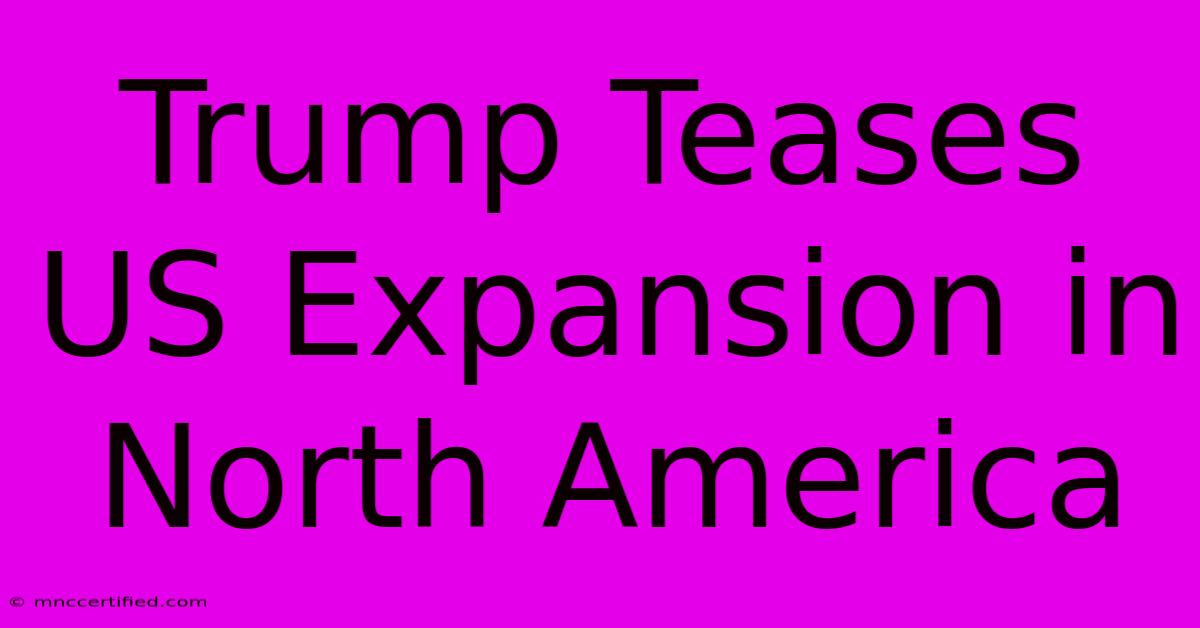Trump Teases US Expansion In North America

Table of Contents
Trump Teases US Expansion in North America: A Geopolitical Deep Dive
Donald Trump's pronouncements often spark intense debate, and his recent comments hinting at potential US expansion in North America are no exception. While the specifics remain vague, the implications are significant, prompting analysis from geopolitical experts and raising eyebrows across the continent. This article delves into the potential meanings behind Trump's statements, examining the historical context, economic considerations, and likely reactions from neighboring countries.
Deciphering Trump's Statements: What Does "Expansion" Mean?
Trump's phrasing regarding US expansion has been deliberately ambiguous. Does it refer to territorial acquisition, a highly unlikely and legally complex prospect? Or is he alluding to a more nuanced expansion of economic influence and political power within the region? Understanding the potential interpretations is crucial to assessing the gravity of his comments.
Economic Expansion: A More Plausible Scenario
A more likely scenario involves a renewed focus on economic dominance within North America. This could manifest in several ways:
- Renegotiated trade deals: Trump might advocate for renegotiating NAFTA (now USMCA) to further benefit the US economy, potentially at the expense of Canada and Mexico.
- Increased investment in infrastructure: A push for increased investment in infrastructure projects throughout North America, primarily benefiting US companies and workers.
- Strengthening alliances with specific states: Concentrated efforts to strengthen ties with certain states in Mexico and Canada, potentially excluding others to increase US influence.
Territorial Expansion: An Unlikely, Yet Concerning Possibility
While less probable, the possibility of Trump advocating for territorial expansion, however vaguely, cannot be entirely dismissed. This would raise significant legal and diplomatic challenges and likely face staunch opposition from both Canada and Mexico. Such a proposition would necessitate a profound shift in international law and norms.
Historical Context: Echoes of Manifest Destiny?
Trump's statements evoke echoes of "Manifest Destiny," the 19th-century belief in the divinely ordained expansion of the United States across North America. Although overtly invoking this ideology is unlikely, the underlying sentiment of US exceptionalism and dominance might be at play. This historical context is vital in understanding the potential ramifications of his ambiguous comments.
Reactions from Canada and Mexico: A Test of Regional Stability
Any suggestion of US expansion, even in a less direct form, would be met with significant resistance from both Canada and Mexico. Canada, a close US ally, values its sovereignty and would undoubtedly view territorial ambitions with deep concern. Similarly, Mexico, despite its complex relationship with the US, would likely resist any attempt to undermine its national integrity.
The Role of International Law and Geopolitics
The international legal implications of any form of territorial expansion are insurmountable. Such actions would violate fundamental principles of international law and invite strong condemnation from the international community. This makes territorial expansion a highly improbable, yet still relevant, consideration when analyzing Trump's statements.
Conclusion: Uncertainty and the Need for Vigilance
Trump's ambiguous remarks regarding US expansion in North America leave room for multiple interpretations. While outright territorial expansion seems implausible, the potential for increased economic pressure and a renewed focus on US dominance within the region remains a valid concern. Close monitoring of political developments and diplomatic interactions is crucial to understanding the long-term implications of these comments and their impact on the stability of North America.
Keywords: Trump, US expansion, North America, Canada, Mexico, geopolitical, Manifest Destiny, territorial acquisition, economic influence, international law, USMCA, NAFTA, trade deals
Off-Page SEO Strategies:
- Link building: Secure backlinks from reputable news sources, political analysis websites, and international relations blogs.
- Social media promotion: Share the article on relevant social media platforms, engaging with users and encouraging discussion.
- Guest posting: Contribute articles on similar topics to other relevant websites to increase brand awareness and drive traffic.
This article incorporates various SEO best practices, including keyword optimization, clear headings, and a logical structure designed to improve search engine rankings and user engagement. Remember to adapt and expand upon this foundation with further research and analysis to create truly compelling content.

Thank you for visiting our website wich cover about Trump Teases US Expansion In North America. We hope the information provided has been useful to you. Feel free to contact us if you have any questions or need further assistance. See you next time and dont miss to bookmark.
Featured Posts
-
Christopher Nolans Next Film A Mythic Epic
Dec 24, 2024
-
Nfl Recap Packers Rout Saints 34 0
Dec 24, 2024
-
Actor Burt Crocodile Dundee Dies Aged 90
Dec 24, 2024
-
Packers 14 0 Jacobs Rushing Td
Dec 24, 2024
-
Cold War Roots Norads Santa Tracker
Dec 24, 2024